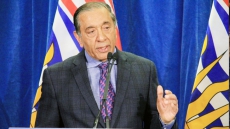VANCOUVER — A professor who has taken a stand against the publication of research in journals that aren't peer reviewed says he has been suspended from the campus of the university where he works in the Interior of British Columbia.
In an article written for a journal published by the University of Toronto Press, Prof. Derek Pyne raised questions about the practice followed by some professors who publish research in so-called predatory journals.
Pyne, who has taught at Thompson Rivers University's school of business and economics since 2010, said his troubles began following the April 2017 publication of his research article titled "The Awards of Predatory Publications at a Small Business School." He did not name any professors or the university he based his research on in the peer-reviewed Journal of Scholarly Publishing.
The article says 16 of 27 professors with research responsibilities paid so-called predatory journals that don't require research to be peer reviewed to publish their work up to the end of 2015 and that they landed promotions.
Meanwhile, the Canadian Association of University Teachers has taken on Pyne's case to determine whether his academic freedom has been violated.
In an interview, Pyne said the careers of professors who have their work published in predatory journals have advanced.
"It's positively related with winning school-of-business research awards. They tend to get paid more because it's a lot easier to write for predatory publications so you've got more time to do overload teaching to earn extra money teaching extra courses or teaching online courses," Pyne said.
"You'd think the mistakes would be made by the most inexperienced people. However, the higher the academic ranking, the more likely they are to have predatory publications."
Pyne argues Thompson Rivers University, which is in Kamloops, violated his academic freedom by retaliating against him as his research gained attention.
The university said Pyne's academic freedom is fully protected under the collective agreement with the Thompson Rivers University Faculty Association.
"Action taken against Dr. Pyne was not related to his specific research, the dissemination of his research, or the exercising of his right to academic freedom," it said in a statement.
Interim university president Christine Bovis-Cnossen would not discuss the matter, citing privacy concerns, saying Payne had not provided consent for her to discuss his case. Pyne emailed her on Wednesday saying she could discuss his case and forwarded the email to The Canadian Press.
Pyne said he has been banned from campus since May, except to meet with his union. He said he has been placed on an unpaid suspension linked to his critical feedback of a colleague who was being considered for a position at the university.
In his feedback, which is open to all faculty as part of the hiring process, Pyne alleged that the colleague was involved in 12 cases of predatory research.
Pyne said the university alleged the feedback, which he sent to a staff member collecting it for the selection committee and the university's then-president, amounted to defamation.
"Right now, they're saying I'm banned from the university," he said, adding administrators do not consider his current status a suspension even though he is not allowed to teach at the university.
"By separating them they can try to claim it's not related to academic freedom," Pyne said of the two issues involving the criticism he has levelled.
The colleague who received the critical feedback said Pyne's issues have "absolutely nothing to do with academic freedom."
"Derek Pyne has all the academic freedom in the world to say whatever he wants to say," he said in an interview.
The colleague declined comment on whether he would take legal action involving the alleged defamation and did not wish to discuss his research.
David Robinson, executive director of the Canadian Association of University Teachers, said the group informed Thompson Rivers it has formed a committee to examine whether Pyne's academic freedom has been violated.
The association was formed in 1951 and offers courses, workshops and conferences as well as collective bargaining and legal support to its member associations. It campaigns on issues related to academic freedom and represents over 70,000 academic staff at mostly unionized universities and colleges.
Bovis-Cnossen responded to Robinson in a letter dated Nov. 2, saying Pyne's union had not filed a grievance and that would be the appropriate process to settle disputes arising from cases of alleged infringement of academic freedom.
"Accordingly, TRU will not participate in the investigation you propose in as much as you have no authority or jurisdiction to bring such an investigation into matters covered in our collective agreement with (the union)," she said in the letter, which Robinson provided to The Canadian Press.
Robinson said emails and documents Pyne has forwarded suggest his research on predatory journals is at the heart of the university's actions against him.
"We had hoped that in the spirit of clearing things up and getting to the bottom of the matter that the administration would co-operate with the investigation," he added.
In rare cases, a university that fails to address concerns raised in a report by the association regarding academic freedom could be put on a censure list, which notifies academics to "blacklist" the institution by not speaking there or accepting any honorary degrees or jobs, Robinson said.
Pyne said he doesn't know why the union has not filed a grievance in his case, although it grieved two weeks of unpaid suspension between July and August in an unrelated matter that he says also remains unresolved.
Union president Tom Friedman would not comment on Pyne's case.
"Certainly, Dr. Pyne is getting full representation from the faculty association and that's according to our constitution. But I can't go into any details about what that representation has meant."
Prof. Mark Mercer, president of the Society for Academic Freedom and Scholarship, said he has been corresponding with Bovis-Cnossen to ask about Pyne's case but she has cited privacy laws in declining to discuss the university's response. The society is a non-profit organization that focuses on issues affecting academic freedom.
All professors have a responsibility for the proper functioning of their community of scholars and criticism of their work is part of it, said Mercer, who teaches philosophy at Saint Mary's University in Halifax.
"I don't know how this could constitute anything other than a violation of Dr. Pyne's academic freedom, given what we know," he said.

